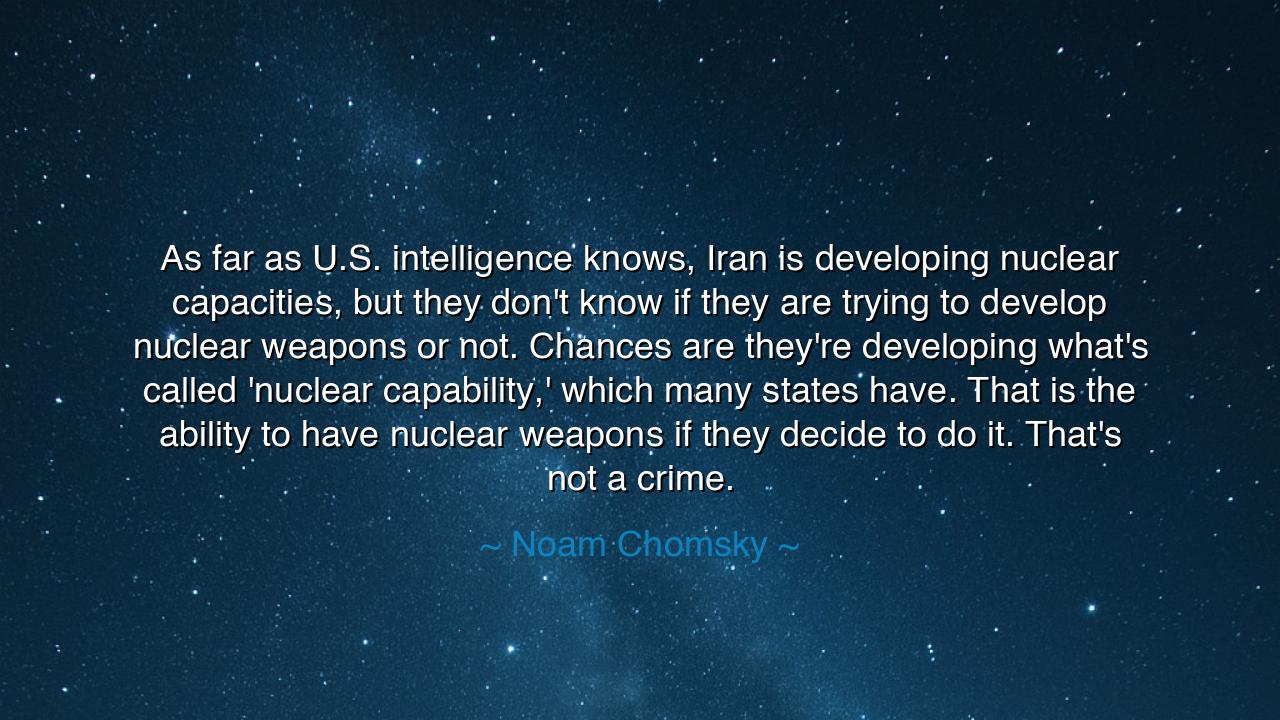
As far as U.S. intelligence knows, Iran is developing nuclear
As far as U.S. intelligence knows, Iran is developing nuclear capacities, but they don't know if they are trying to develop nuclear weapons or not. Chances are they're developing what's called 'nuclear capability,' which many states have. That is the ability to have nuclear weapons if they decide to do it. That's not a crime.






The words of Noam Chomsky — “As far as U.S. intelligence knows, Iran is developing nuclear capacities, but they don't know if they are trying to develop nuclear weapons or not. Chances are they're developing what's called 'nuclear capability,' which many states have. That is the ability to have nuclear weapons if they decide to do it. That's not a crime.” — are not merely the analysis of a political thinker, but a mirror held up to the complex morality of power, fear, and truth in our age. Beneath his calm reasoning lies a wisdom that transcends politics: the recognition that knowledge is never complete, that judgment without certainty is arrogance, and that power without truth is peril. Chomsky’s words remind us that in the realm of nations, as in the heart of man, ignorance dressed as certainty leads to tragedy.
When Chomsky speaks of “U.S. intelligence” and its uncertainty, he touches the eternal paradox of knowledge itself. In every empire, those who claim to know the intentions of others are often blind to their own. Intelligence, no matter how advanced, is never the same as truth. It is interpretation — human, fallible, colored by fear and ambition. What he unveils is not merely the state of Iran’s laboratories, but the state of the human condition: our tendency to fill the gaps in knowledge with suspicion, to assume the worst of our enemies, and to justify action upon shadows rather than substance. The ancients would have called this hubris — the folly of presuming to see all.
To understand the weight of this quote, we must recall history. In 2003, the world witnessed the invasion of Iraq, justified by intelligence claiming the existence of weapons of mass destruction. Those weapons were never found. The cost was immense — hundreds of thousands of lives lost, nations broken, faith in justice shattered. Chomsky’s words, uttered in the wake of that era, ring as both warning and lament: that the lesson of the past is too easily forgotten. He reminds us that to act upon assumption rather than fact is to unleash chaos disguised as order. The same sword that claims to protect truth may, in ignorance, destroy it.
Yet the quote is not about Iran alone, nor about America alone — it is about human nature. Every individual, like every nation, faces the temptation to act upon fear rather than understanding. We see it in families, in communities, in ourselves: the moment we believe we “know” another’s intent, we cease to listen, and we prepare for battle. Chomsky, in his quiet, relentless logic, urges humility — the discipline to accept uncertainty, to seek evidence before judgment, to know the difference between capability and intention. The wise do not confuse what can be done with what is being done. To do so is the beginning of injustice.
Even the ancients understood this wisdom. Consider Thucydides, the historian of the Peloponnesian War, who watched Athens destroy itself in paranoia and pride. Convinced that its rivals plotted against it, Athens struck first — and in doing so, ensured its own ruin. Thucydides wrote that “fear, honor, and interest” were the roots of war — the same forces that drive modern nations to act upon uncertain knowledge. Chomsky, in the same spirit, warns that when fear replaces fact, when interest replaces inquiry, humanity walks again toward self-destruction.
There is, too, a deeper moral in this reflection. Chomsky reminds us that knowledge must be guided by conscience. To know something is possible does not mean it must be feared. To suspect wrongdoing does not justify condemnation. Just as the individual must master his impulses, so too must nations master their power. The possession of capability — whether military, scientific, or political — is not itself evil. It is the use of that power, the intention behind it, that defines righteousness or ruin. Thus, he teaches that restraint is the highest form of strength, and understanding is the purest form of security.
The lesson, therefore, is not for statesmen alone but for all who live and judge in a world of half-truths. Do not act from fear when you have not yet seen the truth. Do not condemn where knowledge is uncertain. Be patient, be discerning, and seek to understand before you decide. For wisdom is not in having power, but in knowing when not to use it. The world will always have its “nuclear capabilities” — the potential for harm, the capacity for creation or destruction. But as Chomsky’s words reveal, it is not capability that defines the soul of a people; it is choice.
And so, O listener, remember this: to act justly, you must see clearly — and to see clearly, you must first admit how little you know. For those who act upon shadows bring forth darkness, but those who wait for the light — they are the ones who guard the peace of the world.






AAdministratorAdministrator
Welcome, honored guests. Please leave a comment, we will respond soon